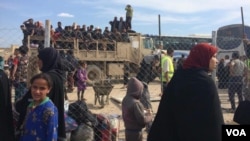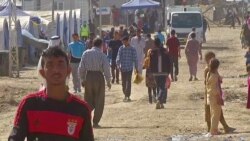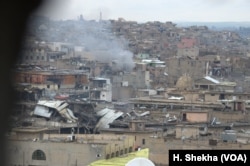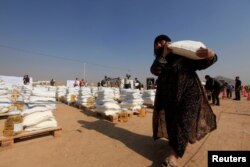The Iraqi government is struggling to accommodate the thousands of people fleeing fighting in west Mosul, and some civilians are being sent back to Islamic State-free sectors in the eastern part of the city to make room, Kurdish officials told VOA.
People have been fleeing Mosul in large numbers since the start of the Iraqi offensive against IS in October 2016. Their ranks rose to 600,000 this week, the Iraqi Ministry of Migration and Displacement said.
"Most camps are full now," Ghayath Surchi, spokesman for the Kurdistan Patriotic Union in Mosul, told VOA. "The Iraqi government is accelerating the return of civilians from the east to make space for residents who will flee IS in the west. There is internal pressure to appropriately accommodate the displaced civilians and international pressure to continue advances against the terrorists."
Backed by the U.S.-led coalition, Iraqi forces declared eastern Mosul "fully liberated" in January. Since then, as many as 133,000 residents have returned to their homes in neighborhoods designated as safe, according to the Iraqi migration ministry.
But tens of thousands of people have refused to go back, fearing for their safety if IS returns and wary of renewed clashes. Their ranks continue to swell refugee camps even as thousands are fleeing fighting in the western part of the city.
Cramped camps
IS controls several western neighborhoods, locally known as Old Mosul. At least 400,000 people are believed to be stranded there, and the U.N. refugee agency has warned that they could swamp the already overwhelmed refugee camps.
That lack of a safe haven has affected the pace of the military offensive against IS, Kurdish officials said.
"The concern that thousands more civilians will flee their homes in Old Mosul without a shelter to go to has even slowed the Iraqi operation against IS," Surchi said. "The government should first make sure there is space for them in the refugee camps."
According to the Iraqi government and relief organizations, about 50 percent of displaced Mosul residents are housed in 19 camps near the city. The remainder are sheltering with relatives and tribal communities, or squatting in unfinished or abandoned buildings in other cities.
Those in the cramped camps often complain about a lack of food and water. They report increased infectious skin diseases and diarrhea because of poor sanitary conditions.
"We are put in this camp as if we live on air," said Khadijah Muhsein, 54, who fled the Bab al-Beid district of western Mosul last month. She and her family of seven are housed along with more than 30,000 other displaced people in the Hammam al-Alil camp, south of Mosul.
She said dozens of people were arriving every day, forcing camp organizers to overload tents.
"Why do they keep bringing more people if there is no food to eat and no work to do here?" asked Muhsein.
Dire situation
Fathi Unis, who heads the camp's food distribution, said the Iraqi government is doing its best to meet residents' needs.
"Each person in the camp receives nine kilograms of flour, three kilograms of rice, two kilograms of sugar and one bottle of oil per month," Unis said.
The dire situation in the camps, combined with government efforts to return residents to recaptured neighborhoods, is encouraging many civilians to return home.
But returning residents say most neighborhoods remain unsafe because of IS rockets and car bombings. They complain about shortages of clean water, medicine and government services. They say most businesses remain shuttered, forcing them to depend on savings and charity.
"We're only brought untreated water from the wells. It is very unhygienic," Zaynab Mustafa, who recently returned to Mosul's al-Shuhada area, told VOA.
Mustafa's family members burned most of their furniture for heating because of a lack of fuel during the winter, and they cut back to one meal a day, he said.
"The government is only paying attention to neighborhoods controlled by IS, while we're forgotten here," said Mustafa.








